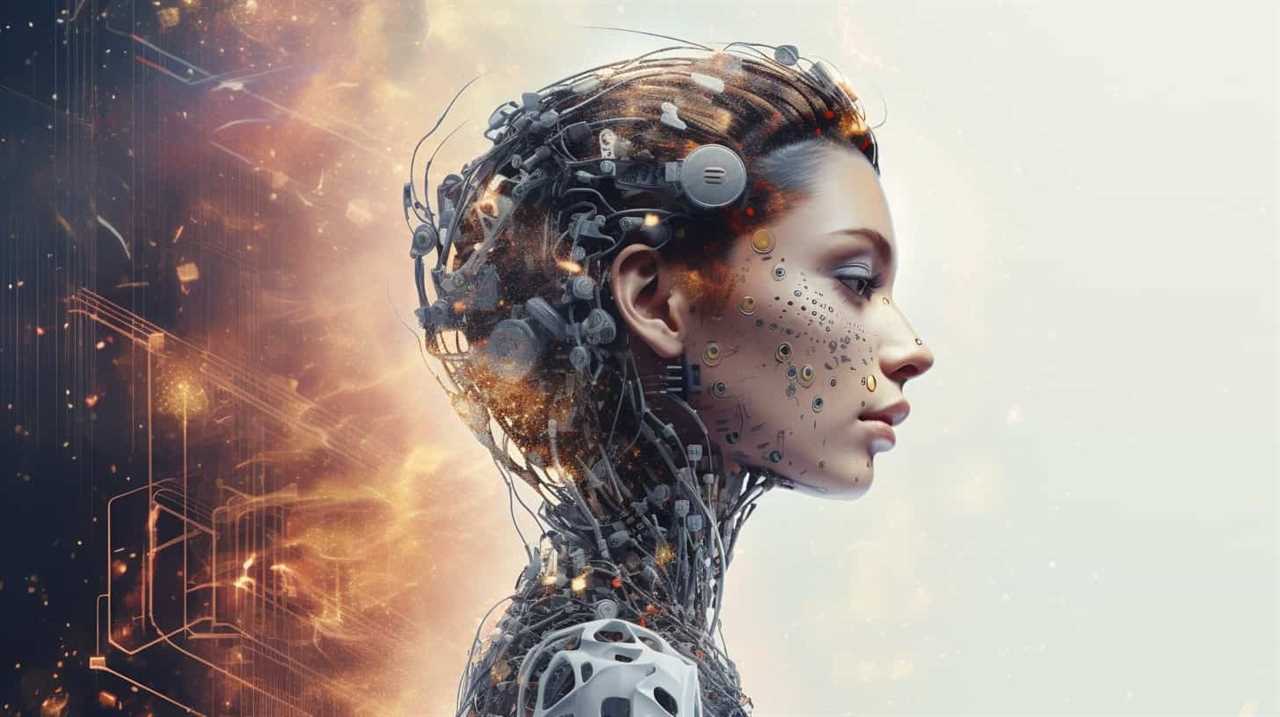As a respected hyperpop artist associated with PC Music, I have faced doubters on my journey. Certain articles have insinuated that I am not a true artist, but just a digital creation. Despite this, I have always seen AI as a beneficial tool for my creativity, rather than a threat to my genuineness.
In fact, I firmly believe AI has the power to revolutionize the creative industry. It can lower barriers for emerging musicians and streamline tasks, saving time and energy.
Join me as we explore the limitless possibilities AI brings to music.
Key Takeaways
- Hannah Diamond sees AI as a tool that can enhance her creativity, not a threat to her artistry.
- AI has the potential to lower barriers for emerging musicians by providing access to tools and resources.
- Young musicians, particularly those aged 16-24, are three times more likely to use AI compared to older musicians, benefiting from its ability to overcome financial barriers and save time.
- AI has the potential to level the playing field in the music industry by assisting independent artists with tasks traditionally handled by larger teams.
Hannah Diamond’s Journey With AI
In my journey with AI, I’ve discovered the incredible power it holds for unleashing creativity in music. One artist who’s embraced this power is Hannah Diamond, an acclaimed hyperpop artist associated with PC Music. Hannah Diamond has been at the forefront of AI collaborations in the music industry, using AI as a tool to enhance her creative process.

However, artists embracing AI also face certain challenges. One of the main challenges is the fear that AI will replace human creativity. Critics argue that AI-generated music lacks the emotional depth and authenticity that comes from human expression. Another challenge is the stigma surrounding AI in the creative industry. Some people believe that using AI is cheating or takes away from the artist’s talent.
Despite these challenges, Hannah Diamond’s success with AI collaborations showcases the immense potential AI holds for pushing the boundaries of creativity in music.
The Impact of AI on the Creative Industry
The creative industry’s transformation through AI’s impact is undeniable. AI hasn’t only revolutionized music production but has also made its mark on various artistic fields, including fashion. AI’s impact on the fashion industry has been significant, with designers using AI algorithms to generate new designs, predict trends, and enhance the overall creative process.
However, along with its advancements, ethical considerations arise. Questions about intellectual property, AI-generated content, and the potential loss of human creativity loom over the creative industry. It’s crucial to strike a balance between embracing the benefits of AI and ensuring that ethical guidelines are in place to protect artists’ rights and maintain the integrity of the creative process.

With careful consideration and responsible implementation, AI can continue to transform and elevate the creative industry while preserving the essence of human expression.
Ai’s Role in Music Production
With AI’s ever-evolving capabilities, I’ve witnessed firsthand its profound impact on music production. AI has revolutionized the way music is created, providing artists with innovative tools that enhance their creative process.
From AI-powered software to virtual instruments, musicians now have access to a wide range of AI tools for music creation. These tools can generate melodies, harmonies, and beats, helping artists explore new musical territories.
Additionally, AI can analyze and categorize vast amounts of music data, helping artists discover new sounds and inspirations.

AI’s impact on music production is undeniable, as it has opened up new possibilities for artists to experiment and push the boundaries of their craft.
With AI by their side, musicians are empowered to create unique and groundbreaking music.
Ai’s Potential for Breaking Barriers
As an artist who’s witnessed AI’s profound impact on music production, I’m excited to explore AI’s potential for breaking barriers in the creative industry.
AI has the power to revolutionize the way we create and consume art, making it more inclusive and accessible for everyone. Here are five ways AI can break barriers in the creative industry:

-
AI can help bridge the gender gap by providing a platform for underrepresented voices, like female artists, who’ve historically faced discrimination and skepticism.
-
AI’s ability to analyze data and trends can revolutionize music marketing, allowing artists to reach broader and more diverse audiences.
-
AI can democratize access to resources and opportunities by providing affordable and user-friendly tools for artists, regardless of their financial means.
-
AI has the potential to break down language barriers, enabling artists from different cultures and backgrounds to collaborate and share their art with the world.

-
AI can challenge societal norms and stereotypes, pushing boundaries and encouraging artists to explore new and unconventional forms of expression.
AI’s potential for inclusivity and its impact on music marketing are just the beginning. With further advancements and exploration, AI has the power to break down even more barriers in the creative industry, fostering a more diverse, inclusive, and vibrant artistic landscape.
AI Tools for Young Musicians
How can AI tools empower young musicians to overcome barriers and thrive in the creative industry?
AI tools have the potential to revolutionize the way young musicians compose and market their music. When it comes to music composition, AI tools can act as a virtual collaborator, helping musicians generate melodies, harmonies, and even lyrics. These tools provide a platform for experimentation and exploration, allowing young musicians to push the boundaries of their creativity.

Moreover, AI’s role in music marketing can’t be overlooked. AI-powered algorithms can analyze data and target specific audiences, helping young musicians reach their target market more effectively. By automating tasks such as press releases, social media management, and email campaigns, AI tools enable young musicians to focus more on their craft and less on administrative tasks.
Ai’s Influence on the Music Industry
AI’s impact on the music industry extends beyond individual artists, transforming the way music is created, marketed, and distributed. Here are five key ways that AI is influencing the music industry:
-
AI’s role in music composition: AI-powered tools are revolutionizing the creative process by assisting artists in composing music. These tools can generate melodies, harmonies, and even entire songs, providing artists with a wealth of inspiration and expanding their creative possibilities.
-
AI’s impact on music marketing: AI is revolutionizing the way music is marketed and promoted. With AI algorithms, artists and record labels can analyze data to identify target audiences, optimize advertising campaigns, and personalize content to reach the right listeners at the right time.

-
AI in music recommendation systems: Streaming platforms like Spotify and Apple Music use AI algorithms to analyze user preferences and behavior, creating personalized playlists and recommendations. This enhances the listener experience by introducing them to new artists and music they may enjoy.
-
AI’s role in music production: AI-powered tools can assist in tasks such as audio mastering, sound engineering, and mixing. This streamlines the production process, allowing artists to focus on their creative vision while AI handles the technical aspects.
-
AI’s impact on copyright and licensing: AI algorithms can analyze vast amounts of music data to detect copyright infringement and ensure proper licensing. This helps protect artists’ intellectual property rights and ensures they receive fair compensation for their work.
Historical Context of AI in Music
One significant aspect of the historical context of AI in music is the long-standing presence of algorithmic music systems. From Mozart’s Musikalisches Würfelspiel system to modern AI tools like MusicLM by Google, AI has played a role in music production for decades.

In classical music, AI has the potential to revolutionize the creative process by offering composers new tools for exploration and experimentation.
The evolution of AI in music production has allowed artists to push boundaries and explore new artistic mediums that were previously limited to those with financial means, abled bodies, and social connections. AI-generated images and moodboards, for example, are seen as a hyper version of existing industry practices.
Furthermore, the impact of AI on creativity predates its rise, with social media platforms like Instagram influencing artistic reference and creativity.
Ai’s Contribution to Algorithmic Music
While exploring the historical context of AI in music, it’s important to acknowledge AI’s significant contribution to algorithmic music. AI has had a profound impact on classical music, revolutionizing the way compositions are created and performed. Here are five key aspects to consider:

-
Enhanced creativity: AI algorithms can generate complex musical patterns and structures that push the boundaries of traditional composition. This opens up new possibilities for experimentation and innovation in classical music.
-
Preservation of musical heritage: AI technology enables the analysis and reconstruction of historical compositions, allowing us to experience the works of long-gone composers in new and authentic ways.
-
Ethical concerns: The use of AI in algorithmic music raises ethical questions about authenticity and human creativity. Can a piece composed by AI truly be considered an artistic expression, or is it merely an imitation?
-
Collaborative potential: AI algorithms can work in tandem with human musicians, providing inspiration and generating musical ideas that complement the performer’s skills and style. This collaboration can lead to unique and captivating musical experiences.

-
Accessible music creation: AI tools democratize the creation process, making it more accessible to aspiring composers and musicians who may not have formal training or access to expensive instruments. This can lead to a more diverse and inclusive classical music landscape.
Text-To-Music Capabilities of AI
As an artist exploring the creative power of AI, I have witnessed the remarkable text-to-music capabilities that AI brings to the world of music composition. AI’s impact on songwriting and its role in music composition cannot be underestimated. With the ability to analyze and interpret text, AI algorithms can generate melodies, harmonies, and rhythms that are both innovative and captivating.
Through the use of AI, songwriters and composers are now able to input lyrics or text and have the AI generate accompanying music that perfectly fits the mood and style of the words. This text-to-music capability of AI opens up a world of possibilities for musicians, allowing them to quickly and efficiently create music that aligns with their artistic vision.
To illustrate the text-to-music capabilities of AI, let’s take a look at the following table:
![]()
| Text Input | AI-Generated Music |
|---|---|
| "I’m feeling melancholic and introspective" | A haunting melody with introspective chords and a slow tempo |
| "I want a high-energy, danceable track" | Upbeat rhythms, catchy melodies, and pulsating basslines |
As you can see, AI can translate text into music that captures the intended emotions and vibes. This technology not only saves time and effort for musicians but also pushes the boundaries of creativity in music composition.
Ai’s Impact on Creative Processes
I have personally experienced the transformative impact of AI on creative processes in music composition. AI has revolutionized the way musicians approach their craft and collaborate with others.
Here are five ways AI has changed the game:
-
AI’s effect on music composition: AI algorithms can analyze vast amounts of musical data and generate original compositions, providing endless sources of inspiration for musicians.

-
AI’s impact on music collaboration: With AI, musicians can collaborate remotely and in real-time, breaking down geographical barriers and fostering global artistic connections.
-
AI’s ability to generate new sounds: AI-powered plugins and synthesizers can create unique sounds and textures that were previously unimaginable, expanding the sonic possibilities for musicians.
-
AI’s role in music production: AI tools can automate tasks such as mixing and mastering, allowing musicians to focus more on the creative aspects of their work.
-
AI’s potential for personalized music experiences: AI algorithms can analyze listener data and preferences to deliver tailored music recommendations and experiences, enhancing the connection between artists and their audience.

Ai-Generated Visuals in the Music Industry
One key aspect of AI’s impact on the music industry is the use of AI-generated visuals. AI has revolutionized the way visuals are incorporated into music videos, allowing for stunning and innovative visual experiences.
With AI, artists can create visuals that were previously unimaginable, pushing the boundaries of creativity. AI-generated visuals have the potential to enhance the storytelling and emotional impact of music videos, creating a more immersive and captivating viewing experience for audiences.
Ai’s Influence on Artistic Reference and Creativity
Through AI’s influence on artistic reference and creativity, I’ve witnessed a transformative shift in the way artists draw inspiration and develop their creative vision. AI’s impact on artistic inspiration has been profound, opening up new avenues for artists to explore and pushing the boundaries of what’s possible in music composition.
Here are five key ways in which AI has influenced artistic reference and creativity:

-
AI-powered recommendation systems analyze vast amounts of data to suggest new artists, genres, and songs, expanding an artist’s musical palette.
-
AI algorithms can generate melodies, harmonies, and rhythms based on existing musical patterns, providing artists with fresh ideas and inspiration.
-
AI tools like deep learning networks can analyze and emulate the style and characteristics of specific artists, allowing artists to explore different sonic landscapes.
-
AI can assist in the creation of visual art by generating images, designs, and mood boards that serve as visual inspiration for an artist’s creative process.

-
AI’s ability to process and analyze large datasets can help artists gain insights into current trends, audience preferences, and market demands, guiding their creative decisions.
Frequently Asked Questions
How Did Hannah Diamond Initially Respond to the Articles Suggesting That She Was Not a Real Artist, but a Computer-Generated Model?
In response to the articles suggesting that I wasn’t a real artist, but a computer-generated model, I felt a mix of frustration and determination.
It was disheartening to have my work dismissed simply because of my gender. However, I saw these accusations as an opportunity to prove them wrong. I believe that true artistry knows no boundaries, and I refused to let anyone diminish my creativity.
I’m proud to say that I’ve used AI as a tool to enhance my music, further fueling my artistic vision.

How Do Some Artists View AI in the Creative Industry?
Artists’ perception of AI in the creative industry varies. Some embrace it as a powerful tool that enhances their creative process, while others fear it replacing human creativity. AI’s impact on the industry has been significant, enabling new artistic mediums and leveling the playing field for emerging musicians.
It streamlines tasks like brainstorming lyrics and creating artwork. Young musicians, in particular, are three times more likely to use AI, benefiting from its cost-saving and time-saving capabilities.
What Are Some Examples of AI Tools Used in Music Production Software?
AI tools used in music production software include AI-generated melodies and AI-powered virtual instruments.
These tools have revolutionized the creative process by offering endless possibilities and expanding the boundaries of musical expression.

With AI-generated melodies, musicians can explore new musical ideas and experiment with unique compositions.
AI-powered virtual instruments provide realistic and high-quality sounds that enhance the overall production value of music.
These AI tools have undoubtedly reshaped the music production landscape, allowing artists to push the boundaries of their creativity.
How Has AI Helped Young Musicians Overcome Financial Barriers?
AI has been a game-changer for young musicians facing financial barriers. With AI tools, they can now access music production software and resources that were once limited to those with financial means. This levels the playing field and opens up opportunities for emerging artists to showcase their talent.

AI acts as an engineer, marketer, manager, and admin assistant, saving time and money. It’s incredible how AI’s impact on the accessibility of music production has revolutionized the industry for the better.
In What Ways Can AI Tools Assist Independent Artists in Competing With Major Label Artists?
AI tools can assist independent artists in competing with major label artists by revolutionizing music marketing. With AI’s advanced algorithms, these tools can generate press releases, marketing strategies, and emails to venues, allowing independent artists to reach a wider audience and gain exposure.
Moreover, AI can help level the playing field by providing access to resources that were traditionally only available to major label artists with larger teams. This can disrupt the music industry’s business model, empowering independent artists to thrive in a highly competitive landscape.
Conclusion
In conclusion, AI has truly revolutionized the music industry. I’ve personally witnessed its transformative power in my own career. From helping me generate lyrics to creating stunning visuals, AI has become an invaluable tool in enhancing the creative process.

It hasn’t only broken down financial barriers for emerging musicians but has also opened up a world of possibilities for artistic expression. AI isn’t a threat to authenticity, but rather a powerful ally in pushing the boundaries of music and creativity.
As the saying goes, ‘AI is the artist’s secret weapon, unlocking limitless potential.’









